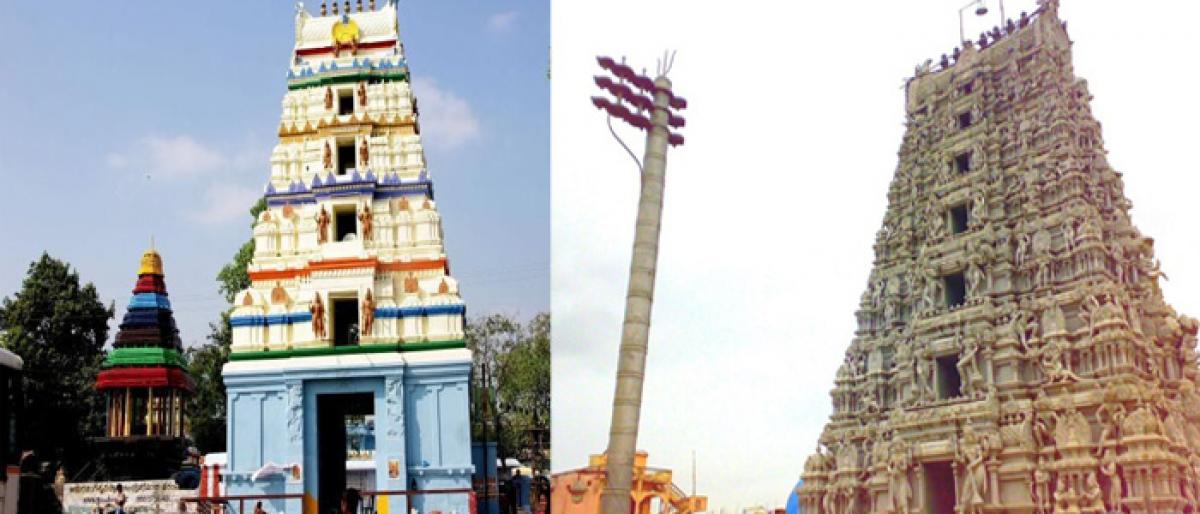One Lingam, Five Temples

Once upon a time, there was a Rakshasa King, Tarakasura and he owned a magnificent and powerful Shiva Lingam. Or so the story goes. A war ensued between the devas and the asuras, the classic showdown between Gods and demons, but Kumaraswamy who was fighting Tarakasura couldn’t kill him, no matter how.
Once upon a time, there was a Rakshasa King, Tarakasura and he owned a magnificent and powerful Shiva Lingam. Or so the story goes. A war ensued between the devas and the asuras, the classic showdown between Gods and demons, but Kumaraswamy who was fighting Tarakasura couldn’t kill him, no matter how.
For at every deadly blow, the rakshasa would reform, limb to limb, from his cut off body parts. This power to rejoin came from this very mighty Shiva Linga that the demon wore. And the only way to destroy him was to break the lingam first.
So it was to be and at the end of this battle between him and Kumaraswamy, Lord Shiva’s younger son and Ganesha’s brother, there came to be five pieces of the mythical Shiva Lingam. Which fell in five different places in Andhra Pradesh. Temples were then built in those locations around the fragments and it is these five ancient temples that now constitute the Pancharama Kshetras.
All of the Pancharama temples are two-storeyed stone temples. The fragments though are all massive Shiva Lingams in themselves. The five fragments were installed and worshipped at five temples by the five
Gods – Indra, Surya, Chandra, Vishnu and Kumaraswamy, according to the legends. The first one, by Kumaraswamy himself, is at Samarlakota near Kakinada and is known as Kumararamam or Bhimaramam variously. The temple is beautiful, peaceful and yet not too crowded like the other four.
The next one nearest to here is Draksharamam. Probably the biggest and definitely the most celebrated of the five, Draksharamam isn’t just a Pancharama Kshetra but also a Shakti Peetham. This expansive 10th-century temple boasts of a rich history and numerous mythological legends are associated with it, which is one of the reasons for its popularity.
Believed also to be the site of the mythical Dakshayagnam - where Daksha Prajapati’s daughter and Shiva’s wife, Sati immolated herself in the Yagna fire – it is one of the 18 major Asthadasa Shakti Peethams in the country. And she manifests here as the Goddess Manikyamba alongside Lord Shiva.
Two of the remaining five Pancharamas are also near each other, in West Godavari. While Somaramam is in Bhimavaram, Ksheeraramam is in Palakollu. The Shiva Lingam in Somaramam is said to change colour according to the phases of the moon.
If it is a pristine white on full moon nights, it is a dark ebony on the days of no moon or Amavasya, probably owing to the fact that legend says, this is the Shiva Lingam that was installed by Chandra or the Moon God himself. In Ksheeraramam, Shiva instated by Lord Vishnu here, is Ksheera Ramalingeswara Swamy and the temple itself flaunts a nine-storeyed temple tower.
The last of the five temples is Amararamam in Amaravati, Andhra Pradesh’s burgeoning new capital. Legend has it that this Shiva Lingam laid here by Indra wouldn’t stop growing and a nail was affixed to it, in an attempt to stop its growth. But the Lingam started bleeding and today devotees from all across flock here, to this ancient temple on the banks of the river Krishna, to catch a glimpse of that red stain on the head of the Lingam.

















